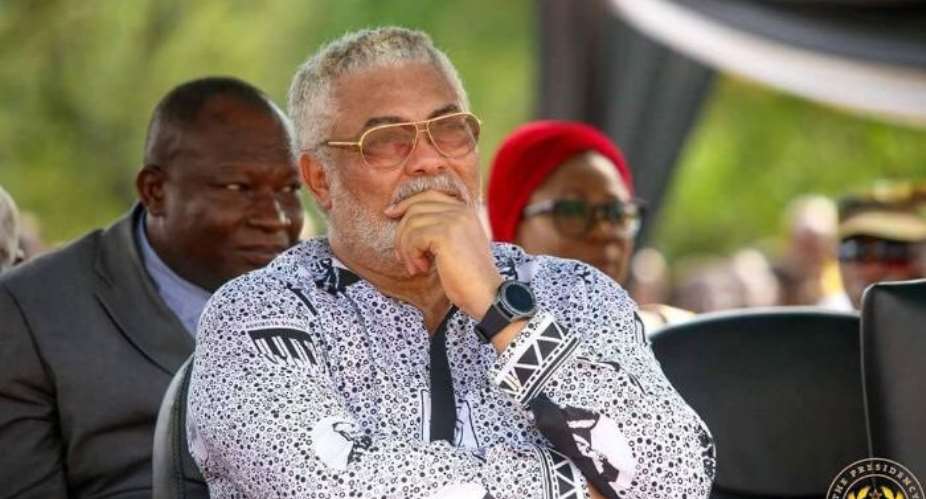Mr. Victor Smith, a former aide to late ex-President Jerry Rawlings has judged his former boss favourably, stating that he will go down in history as a man whose contributions have ensured peace and stability in the country’s socio-political space and democracy.
For him, Rawlings’ effort in putting together the 1992 Constitution and his signing of same into law is a significant action the founder of the National Democratic Congress (NDC) will be dearly remembered for.
Victor Smith who served as Ghana's Ambassador to the Czech Republic and later, High Commissioner to the UK and Ireland believes, although the events marking the change from military to democratic rule should have led to a faster growth of the Ghanaian economy, he said that fundamental bold step in Ghana’s political development is a bequest worth celebrating.
“The legacy he has left us today is the 1992 Constitution which he signed into law and has remained and kept our country stable although most Ghanaians want us to move faster in terms of socio-economic development,” he said on Eyewitness News while eulogizing Rawlings after his burial on Wednesday.
He acknowledged what he described as the ‘illegal’ manner through which Rawlings became known in politics but quickly added that it was however helpful saying “this is Rawlings, who came into the political scene illegally but once he succeeded, we saw the principles he came with on the scene”.
Victor Smith in his eulogy further reminded persons who might have been affected by Rawlings’ revolution that the ex-President had apologized for what many described as excesses of the regime.
According to him, notwithstanding this, Rawlings must be accorded with the commendation due him given the positive impact his being in office has had on the country.
“Some people don’t like him because they suffered some indignities during the revolution. There are others who understood him. In any case, the prevailing socio-economic conditions at the time were such that people supported the revolution. For me, I will say he didn’t achieve all that he set out to do by way of the principles he meant to prosecute, and I think they are still relevant today. So I want to say to those people who don’t like him for one way or the other, he had the opportunity to say sorry to those people. He explained to them why certain things went wrong”, he stated.
Rawlings initially came to power in Ghana as a flight lieutenant of the Ghana Air Force following a coup d'état in 1979.
Prior to that, he led an unsuccessful coup attempt against the ruling military government on 15 May 1979, just five weeks before scheduled democratic elections were due to take place.
After initially handing power over to a civilian government, he took back control of the country on 31 December 1981 as the Chairman of the Provisional National Defence Council (PNDC).
In 1992, Rawlings resigned from the military, founded the National Democratic Congress (NDC), and became the first President of the Fourth Republic. He was re-elected in 1996 for four more years.
After two terms in office, the limit according to the Ghanaian Constitution, Rawlings endorsed his Vice-President John Atta Mills as the presidential candidate in 2000.
---citinewsroom





 'Kill whoever will rig Ejisu by-election' – Independent Candidate supporters inv...
'Kill whoever will rig Ejisu by-election' – Independent Candidate supporters inv...
 Ashanti Region: ‘Apologize to me for claiming I owe electricity bills else... – ...
Ashanti Region: ‘Apologize to me for claiming I owe electricity bills else... – ...
 Ghana is a mess; citizens will stand for their party even if they’re dying — Kof...
Ghana is a mess; citizens will stand for their party even if they’re dying — Kof...
 Internet shutdown an abuse of human rights — CSOs to gov't
Internet shutdown an abuse of human rights — CSOs to gov't
 Free SHS policy: Eating Tom Brown in the morning, afternoon, evening will be a t...
Free SHS policy: Eating Tom Brown in the morning, afternoon, evening will be a t...
 Dumsor: A British energy expert 'lied' Ghanaians, causing us to abandon energy p...
Dumsor: A British energy expert 'lied' Ghanaians, causing us to abandon energy p...
 What a speech! — Imani Africa boss reacts to Prof. Opoku Agyemang’s presentation
What a speech! — Imani Africa boss reacts to Prof. Opoku Agyemang’s presentation
 Dumsor: Tell us the truth — Atik Mohammed to ECG
Dumsor: Tell us the truth — Atik Mohammed to ECG
 Dumsor: Don't rush to demand timetable; the problem may be temporary — Atik Moha...
Dumsor: Don't rush to demand timetable; the problem may be temporary — Atik Moha...
 Space X Starlink’s satellite broadband approved in Ghana — NCA
Space X Starlink’s satellite broadband approved in Ghana — NCA
